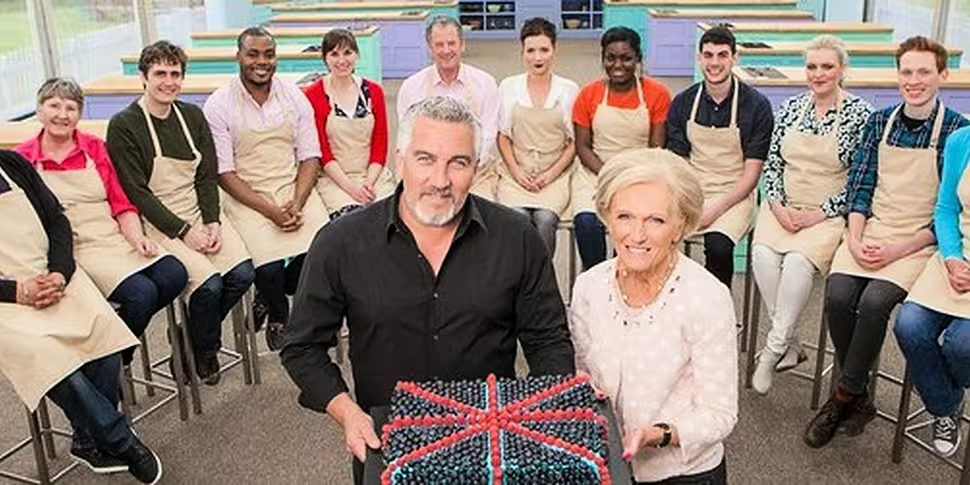First 2016 came for Bowie. Then it smeared its grubby prints all over Prince, Alan Rickman, and Gene Wilder. Then it pulled the UK out of the European Union. It's not entirely to blame for Roxxxy Andrews' verse in Read U Wrote U, the other travesty of reality competition television this year, but it played its part. But now 2016, the swine, is mooning us all with its moist and soggy bottom. Love Productions, the TV company that brought the TV show to the BBC in 2010, has pulled the show from its midweek prime-time slot on the British national broadcaster. Come 2018, and maybe with Richard Ayoade in tow (an inspired choice making 2018 immediately better than 2016), the Great British Bake Off will make its way to Channel 4 – which as everyone has pointed out already, just paid €88m for a tent with some ovens and a scouser in it.
Tonight's finale of the beloved baking show's season will crown the seventh star baker, with either Andrew, Candice, or Jane set to lift the Pyrex cake stand while poorly attempting to hold back their tears in the stiff-peaks upper-lipped way that only Brits can. But with Mary, Mel and Sue having stuck with the BBC, all that's made its powdery way through the sieve and into Channel 4's mixing bowl is Paul Hollywood, the man whose thing is single-handedly keeping the wet-look hair gel market in business.
Fans of the show have not been taking the news well. A surprise hit that has seen its audience grow every year, 2010’s final was watched on BBC 2 by roughly 3m viewers. By the time Nadiya Hussein claimed the title of the ultimate star baker of season six, the show was the most watched TV programme of 2015, with some 15m viewers, give or take a liberal shaking of hundreds and thousands, turning the show into a juggernaut. At the time of writing, 36,000 people had signed a petition trying to keep the show at the BBC, with the jokes about waiting for Mary Berry to trigger “Arctic Roll 50” writing themselves.
Winning three BAFTAs (and a fourth one for Junior Bake Off) as well as the much coveted Rose D’Or, Bake Off started off as a cult hit, proving itself a steady grower and rising better than the dough on screen. The UK version of the show, as of 2015, was broadcast in 196 territories around the world, while the format has been sold to 20 countries around the world, making it the BBC’s third most successful after Strictly Come Dancing and The Weakest Link.
“It’s tremendously exciting to have found a broadcaster who we know will protect and nurture The Great British Bake Off for many years to come,” said Love Productions’ creative director Richard McKerrow when the announcement was made, outlining plans for three series on the commercial channel, as well as a handful of celebrity specials.
Arguably, Love Productions doesn’t need the money and presumably could have gotten by on the £15m-per-year offered to it by BBC executives, topped up by a further £10m by Channel 4 – and its advertisers. But money isn’t on Maslow’s pyramidal hierarchy pile, with 'desire to make as much as possible' being the entirely justified foundation of everything in capitalism. Love Productions is not in the business of public service broadcasting, it is in the business of business.
It’s just that the BBC and GBBO are divorcing and mum’s new boyfriend is a little bit more flash and trying much harder to impress you by being cool. He has all the kitchen utensils, but you prefer dad’s wonkier whisk. During the breaks, between playful double entendres, will be ads for shows in which members of the public pick a date after examining a line up of five penises. Or late night spin offs in which his lad mates play Countdown ironically. That's the way this conundrum crumbles. The BBC, on the other hand, was the perfect bedfellow for the Bake Off tent, a quintessential celebration of British bourgeoisie and Middle Englishness so profound that it comes with its own line of tie-in bunting to tie up around your conservatory. No kitchen-sink dramas, rather an enviable look at proving drawers and KitchenAid mixers. A show where the most shocking things ever witnessed wer a flash of sciurine scrotum, bin-gate, and the piercing blue eyes of Paul Hollywood.
Adverts are always a part of the Irish viewer's TV experiences, an inescapable reality in a country of 4.75m people. Keeping the lights on over in Montrose or Ballymount or Baile na hAbhann while keeping the cameras rolling means breaks and sponsorship. It’s one, but not the only one, of the reasons why the Great Irish Bake Off just didn’t quite work on TV3 during its three seasons. Among other complaints, budgeting in time for adverts stripped the Irish show of one of the challenges viewers had come to expect, with TV3’s weekly episodes picking and mixing two out of the signatures, technicals and showstoppers. It left the pace of the show lacking somewhat, hampered even more so by technical challenges that were essentially recreations of an entire recipe from the Merrion Hotel, so finicky and elaborate that few of the bakers could succeed.
But still, the show must go on. Just not until 2018. The BBC, who we on this side of the Irish Sea admire as the ultimate paragon of licence-fee broadcasting (while never once actually paying for it), at least had a wire-cooling-rack clause written into its contract, We’ll have to wait a full year for the show to make the switch over. Whether Mary, Mel and Sue will be fronting Brexit Britain Bakes on the Beeb in the year to come remains to be seen, but the show's departure from its home leaves a hole in our heart bigger than the ones in Paul Hollywood's ring doughnuts.









